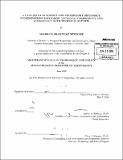A case study in science and technology diplomacy : understanding diplomats' technical competency and interaction with technical experts
Author(s)
Newsome, Sherrica Shawnyae
DownloadFull printable version (5.125Mb)
Other Contributors
Massachusetts Institute of Technology. Technology and Policy Program.
Advisor
Jeffrey A. Hoffman.
Terms of use
Metadata
Show full item recordAbstract
As science and technology are increasingly at the center of global issues, diplomats are less capable of effectively completing their work without heavily relying on scientists and engineers for clarification and insight. This thesis is motivated by a desire to determine if convincing evidence exists that the lack of diplomats' technical knowledge and/or existing relational difficulties between the diplomat and the technical expert have negative effects on international agreements. The first required step, the focus of this thesis, is to gain an understanding of the technical expert and the diplomat's relationship. This thesis has examined, as a case study, the National Aeronautics and Space Administration Office of External Relations' (OER) diplomats - officially known as international program specialists (IPS). The IPSs were interviewed and the data was analyzed using the grounded theory coding process. Statistics and charts were produced from pre-interview questionnaires and competency data and used as supporting evidence for the interview data. The thesis question is expressed and answered through its three sub-questions: What is the IPS's working relationship with scientists and engineers? How do IPSs go about writing the technical content of agreements? What is the IPS' technical competence? The collective answer is that an IPS does not generate the technical content of agreements, but relies heavily on the technical expert for both the content and its clarification. This lack of technical competence is supported by the fact that only 1% of reported OER's employees' competencies are technical (hard math and science) and only 4% are technically related. Additionally, hypotheses were drawn: An evaluation of the current IPS orientation process and OER training procedures may show that, despite perceived difficulties, the practices are the best available; An increased understanding of the IPS's role, on behalf of the technical experts - especially the field experts, should improve the relationship between the IPS and the technical expert; The technical competence of an IPS is, to some degree, dependent on both (1) the working relationship an IPS has with the technical expert and (2) the IPS' capability, capacity, and desire to learn. The study largely implies that the lack of understanding of the diplomat's role may also be apparent in other technical organizations where the method of diplomacy aiding science and technology is practiced.
Description
Thesis (S.M. in Technology and Policy)--Massachusetts Institute of Technology, Engineering Systems Division, 2010. Cataloged from PDF version of thesis. Includes bibliographical references (p. 69-70).
Date issued
2010Department
Massachusetts Institute of Technology. Engineering Systems DivisionPublisher
Massachusetts Institute of Technology
Keywords
Engineering Systems Division., Technology and Policy Program.